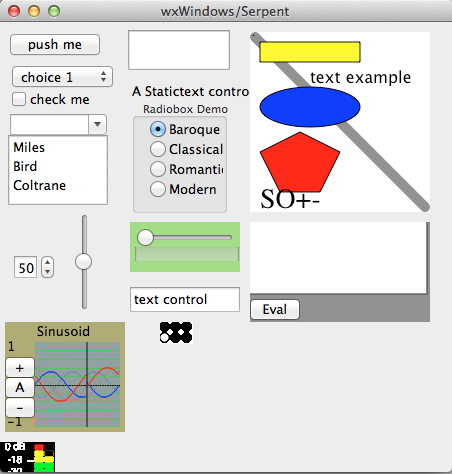
svn checkout svn://svn.code.sf.net/p/serpent/code/trunk serpent
or, if you are a developer and plan to commit changes back to SourceForge,Important: If your serpent directory contains trunk, tags, and branches, check the code above and try again. For these instructions to work, all the repository files in trunk must be copied to the local working copy named serpent. E.g. you should have serpent/README.txt, serpent/32bit, and serpent/64bit. After you install liblo, you should have serpent/../liblo.
svn checkout svn+ssh://rbd@svn.code.sf.net/p/serpent/code/trunk serpent
The following instructions worked for Linux (Ubuntu 14.04 LTS, linked with wxWidgets 3.1.3
sudo apt-get install libwxgtk3.0-gtk3-dev
cd wxGTKwx-build, as shown below:mkdir wx-build
cd wx-build../configure --prefix=/home/rbd/wxGTK/wx-build --disable-shared --with-opengl --enable-monolithicmakesudo apt-get install freeglut3-dev
cd liblo
./configure --enable-static
make
cp src/.libs/liblo.a liblo_s64.a ccmake .sudo apt-get install libzmq3-dev(Note: under Ubuntu, there's a problem. Apparently, zmq depends on the libpgm-dev package.) To build ZeroMQ from sources:
cd zeromq
./configure --without-libsodium
make
make check
mkdir -p lib
cp src/.libs/libzmq.a lib/libzmq_s.a
sudo apt-get install libedit-dev
WX_BASE_PATH. Later, the build files expect to
find an executable <WX_BASE_PATH>/wx-build/wx-config,
produced by wxWidgets configure scripts, that produces compiler
and linker flags needed to link with wxWidgets.
cd serpent/64bitunknown.
(But it appears that the wxWidgets package is lacking some
options assumed by wxSerpent, so it may not work.)
If you have built wxWidgets (recommended), set
HAVE_WX_PACKAGE to OFF, and set WX_BASE_PATH
to your wxWidgets folder
where you installed wxWidgets. E.g. my Value string is
"/home/rbd/wxmac" (without the quotes). make to make serpent64 and
wxserpent64. serpent/64bit/serpent64serpent/64bit/wxsbuild/wxserpent64.Serpent uses the environment to figure out where to search for files.
You may want to copy executables to ~/bin. Then, if you set up your search path appropriately, you can run serpent or wxserpent from any command prompt and any current directory. You may need to modify your PATH environment variable to include the path(s) for serpent and wxserpent. Since serpent is in my ~/bin directory, I add this to my ~/.profile file:
PATH=$PATH:/Users/rbd/bin
export PATH
You also need to tell serpent (and wxserpent) where to search for
serpent source (.srp) files. Chances are good you will be using
bash, so the command is:
export SERPENTPATH=/Users/rbd/serpent/programs:/Users/rbd/serpent/lib:/Users/rbd/serpent/wxslibYou can put these commands into .profile in your home directory so they will be automatically run when you start a shell.
Try these commands:
This will run the init.srp in the current directory (wxs), which is a good simple test. Then try typing print "hello world" into the window with the Eval button and click on Eval. Trycd
serpent64
> print "hello world"
hello world
> exit()
cd ~/serpent/wxs
wxserpent64 init.srp
for more fun. You should see a screen like this:cd ~/serpent/wxslib
wxserpent64 wxs_test.srp
